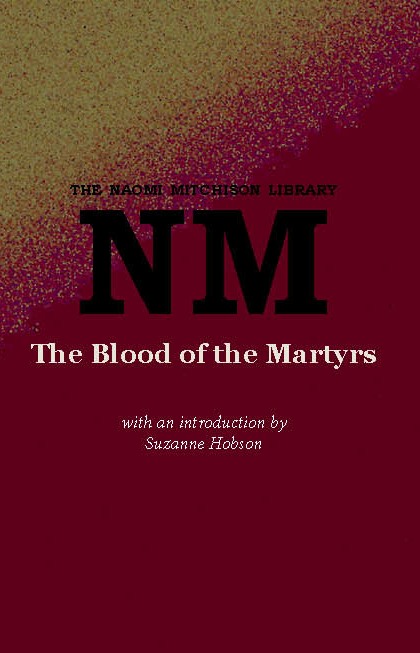|
|

 Home |
Catalogue |
Order |
About
Home |
Catalogue |
Order |
About
|

|
|
The Blood of the Martyrs
| |
| Naomi Mitchison. With an Introduction by Suzanne Hobson |
| ISBN 9781849210287 |
| SERIES The Naomi Mitchison Library |
| Paperback 336 pages |
| |
| Published 27 August 2021
UK Price £14.95
US Price $19.95 |
Naomi Mitchison published The Blood of the Martyrs in October 1939, just a month after the outbreak of the Second World War.
The novel marks a return to the historical subject matter for which she had made her name in widely acclaimed books such as The Conquered (1923) and The Corn God and the Spring Queen (1931).
It is set in the Rome of Emperor Nero around the time of the Great Fire and follows the interconnected lives of two distinct social circles.
The first is the household of the Senator Flavius Crispus who is nostalgic for the more tolerant and rational Rome of a previous age.
The second is a small community of Christians made up of slaves and freedmen and women who meet in secret to share the 'love feast'.
Moving between the two circles is the son of a defeated British king, Beric, who, deprived of legal and political status, has no secure place in either world.
Beric's dilemma, and eventual fate, provides a focal point to a novel made up of multiple individual stories that converge in the same tragic end.
The late 1930s also saw the publication of Mitchison's political polemic, The Moral Basis of Politics. The Blood of the Martyr is in many ways a fictional exploration of the same themes.
Where, Mitchison asks, might we find a 'moral' answer to the threat posed by fascism and the increasing power of the Nation State over the rights of the individual?
She finds hope, if not quite the solution, in the resistance offered by the early Christians to Nero's persecution.
Dedicating her novel to political dissidents and minorities of her own time, she calls for a moral idea around which they too might unite to challenge the tyranny of State power in its characteristic twentieth-century forms.
Naomi Mitchison [1897-1999] was a literary phenomenon. Tireless in her writing, unafraid and often highly unconventional in her opinions, she left an extraordinary legacy. Her novels for adults and children stressed at different times her deep interest in historical and contemporary societies, as well her concerns for the future. She also travelled widely, wrote poetry and plays, memoirs, a war diary, book reviews, political articles, and many letters
Suzanne Hobson teaches twentieth-century literature in the department of English at Queen Mary University of London. She is the author of Angels of Modernism and Unbelief in Interwar Literary Culture: Doubting Moderns and has published articles on Mitchison and a range of other women writers and intellectuals from the same period.
|
|
|
|
|
© Kennedy & Boyd, an imprint of Zeticula Ltd., Unit 13, 196 Rose Street, Edinburgh, EH2 4AT, Scotland
|
| |
| |